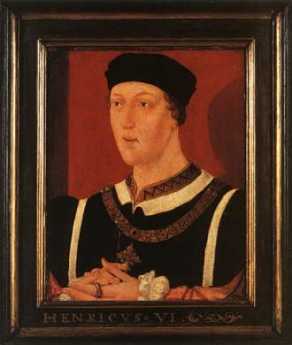 |
| Margaret of Anjou |
Margaret of Anjou (1430-1482) died and was buried two centuries before William Penn arrived on the Delaware River. She'd been Queen of England as the wife of Henry VI from 1445-1471, and a central figure in the so-called War of the Roses. Not a name plausibly associated with Philadelphia.
 |
| Henry VI |
Until, of course, you understand that the Shakespere Society of Philadelphia, world's oldest continuously meeting Shakespeare club, is making her a current focus of attention. It was the idea ofRobert Thomas Fallon, the vice-dean of the society, that Margaret of Anjou appears in four Shakespeare plays. The three histories ofHenry VI and Richard III all get relatively little present attention, but perhaps parts could be extracted and fused into one great play about Margaret. Think of that, a new Shakespeare play after all these centuries.
 |
| English-occupied France at the time of Henry VI |
Disconcertingly, when you examine what the new play would be all about, there's more material than you can handle. Margaret starts out as the most beautiful girl in France and ends up as a scolding, vicious old hag; is that the story, or is it really two plays? The Duke of Suffolk had it in his power to make this starlet into Queen of England, if she perhaps cared to visit his casting couch. Her answer was she had to ask her father, and if you believe that, you will believe anything. With the right stage directions you might imply she was a remarkably dutiful victim, unless the stage directions strongly implied: OK, buddy, you've got a deal.
That's just the beginning, almost the preliminary. You can can go on to portray her quite another way, as the ambitious mother of the Prince of Wales, about to lose his title to the throne because his cuckholded father was a useless coward. She wasn't going to let that happen, no matter who got stabbed to prevent it.
Or, Margaret the Survivor, losing battles with the York faction, then like Saint Joan rallying the hesitant Lancastrians to lose yet another battle and get killed some more. Then fleeing over the channel, to see if the King of France couldn't be sweet-talked into supporting her cause. Thanks, pal; and then she lost his army, too. As we say in South Philadelphia, that dame is Big Trouble.
The Shakespere (be sure you spell it right) Society meets regularly in a cobble-stoned alley near the Philadelphia theater district. The tables don't have carved initials on them, like Mory's, but they don't have tablecloths, either. They admit a new member every few years when someone dies, and they take their Elizabethan literature pretty seriously. The Variorum Shakespeare was created by this group. It was founded by Horace Howard Furness, the brother of Frank Furness the architect. That name is pronounced a little funny, too, which if you are from Philadelphia I don't need to instruct you about.
 |
| the battles and kings associated with the War of the Roses |
Laboring under the burden of this intellectual heritage, the society has to consider some broader implications of the story of Margaret of Anjou. The decontructionists who have recently achieved university tenure tend to challenge most of the settled views on Shakespeare, but in this matter we start with a fresh slate. Doesn't the chaotic period of the War of the Roses stand between two strong Kings, Henry V of Agincourt, and Henry VIII? Wouldn't Shakespeare, that stalwart defender of anointed majesty, have approved the moral that any strong king is better for the nation than any weak one? Maybe that's a theme that should run through our new Shakespearean play. Maybe our play ought to start with Henry V on a high step behind a stage screen, giving his speech to rally the English longbows (We happy few, we band of brothers); and end with Henry VIII, always ready to rise above principle.
Or perhaps the play might make English-French relationships be the core, from William the Conqueror through five centuries, until the English finally do discard the Continent, and Britainnia rules the waves. It's a little hard to imagine Shakespeare, the ultra-English patriot, as an apologist for a united Europe, but perhaps it could be managed.
If that seems too partisan, perhaps Philadelphia could find a peaceful theme. What, after all, was accomplished by the War of the Roses? Does anyone really care who got promoted from earl to duke, or whose great-grandfather had which great grand nephew? One is reminded that the two branches of Philadelphia Quakerdom, the Hicksites and the Orthodox, for a century scolded each other bitterly over doctrinal matters of little present concern. And then Rufus Jones brought them together for annual luncheons, giving a white rose to members of one faction as they entered the door, and a red rose to members of the other. The rules of the luncheon were always the same: nobody could sit next to a person wearing the same color of rose.
No comments:
Post a Comment